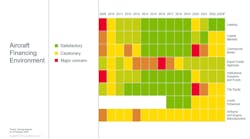Farnborough, UK, July 14th, 2014 – Embraer has released its Market Outlook 2014-2033 which details the Company’s forecast for deliveries of new 70 to 130-seat jet aircraft over the next twenty years. The report examines the main drivers contributing to air transport growth and reviews projected deliveries by world region.
The Market Outlook identifies a need for 6,250 jet aircraft in the 70 to 130-seat capacity category (2,300 units in the 70 to 90-seat segment and 3,950 units in the 90 to 130-seat segment). Replacement of ageing aircraft will represent 56% of new deliveries and 44% will support market growth. The world fleet-in-service of jets with up to 130 seats will increase from 3,850 aircraft in 2013 to 6,580 by 2033. The value of all deliveries is approximately USD 300 billion (list price).
70 to 130-Seat Jet Deliveries - Forecast by Region
Region Deliveries Share
North America 2,010 32%
Europe 1,140 18%
China 1,020 17%
Latin America 700 11%
Asia Pacific 520 8%
CIS 380 6%
Middle East 250 4%
Africa 230 4%
World (2014-2033) 6,250
Embraer expects jets in the 70 to 130-seat category to sustain hub-and-spoke efficiency, to complement narrow-body operations, to provide an optimal balance of frequency and seats, and to encourage new market development with lower-risk, incremental capacity. Those roles will
generate significant demand for new aircraft in the segment.
Embraer foresees worldwide demand for air transport, measured by revenue passenger kilometers (RPKs), increasing an average of 4.8% annually through 2033. By then, demand will reach 13.6 trillion RPKs for all commercial aviation segments.
By region, the Middle East and China will lead with annual RPK growth of 7.1% and 6.8% respectively, followed by Latin America at 6.0%. Asia Pacific, the CIS (Commonwealth of Independent States) and Africa will each have growth rates of around 5%. Because they are more mature markets, Europe (3.9%) and North America (2.7%) will grow more slowly. By 2033, Asia Pacific and China will be the largest air travel markets in the world, accounting for a combined 40% of total global RPKs. Comparatively, Europe and North America will generate 36% of world demand.
ABOUT EMBRAER’S MARKET OUTLOOK
Since the 1st. edition of Embraer’s Market Outlook was published in 2004, the company’s analysts have continuously refined their forecast models in order to identify and predict future trends. The process consists of two main steps: a traffic demand forecast by region based on
econometric models, and a forecast of new aircraft deliveries.
The 2014-2033 Embraer Market Outlook is available at http://www.embraercommercialaviation.com/Pages/Market-Info.aspx?Category=Market
Outlook

